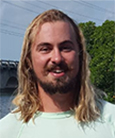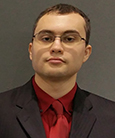Two graduate students at Florida universities have been named recipients of scholarships from the Aylesworth Foundation for the Advancement of Marine Science.
The winners are Devon Pharo, a master’s student at the University of Florida and James Conrad, a Ph.D. student at the University of South Florida.
Since 1986, the Aylesworth scholarship has supported students pursuing college degrees in disciplines that have direct application to marine science. Recipients continue to receive funding from the award each year as long as they make satisfactory progress toward degree completion.
The scholarship is a joint effort of the Aylesworth Foundation, the Southeastern Fisheries Association and Florida Sea Grant. Scholarships worth $596,974 have been awarded to 104 students in 14 Florida universities over the past 30 years.
The winners will be recognized at the annual Southeastern Fisheries Association awards banquet in June. More information about each recipient follows.

Devon Pharo
Devon Pharo is a master’s student in the fisheries and aquatic sciences program within the University of Florida’s School of Forest Resources and Conservation. He is studying how algal blooms might affect stone crabs in Florida Bay. He is also investigating how stone crabs use chemical cues to navigate, and find food and shelter in the hard-bottom communities they inhabit.
“Hard-bottom habitat is an integral part of the ecology of Florida Bay. It provides nursery habitat to a plethora of economically and recreationally important invertebrates and fish, including the Caribbean spiny lobster, stone crab and grouper,” said Pharo, a Florida native who grew up fishing and diving along the state’s coasts.
“Cyanobacteria blooms have a major impact on hard-bottom habitat in the Florida Keys and could have negative effects on the condition of the stone crabs inhabiting these impacted areas.”
Pharo received his bachelor’s degree in biology from the University of Florida. After graduating, he hopes to obtain a government position either in Florida, or another coastal state.
Before starting his master’s program, Pharo worked as wading bird technician for a University of Florida research project studying mercury levels of the great egret population.
“Devon always wanted to discuss the science part of the project, wanted to push further into the history and knowledge base of the work, and always asked good questions,” said Peter Frederick, the project’s principal investigator and a research professor in the UF’s Department of Wildlife Ecology and Conservation. “He definitely has the natural curiosity necessary to be a good scientist.”

James Conrad
James Conrad is a Ph.D. student in biology at the University of South Florida. He is studying why Vibrio vulnificus, a naturally occurring bacteria found in warm, coastal waters worldwide, is capable of causing human illness in some environments at certain times of the years, but not others.
To do this, he is investigating whether modifications to the genetic material of the organism contribute to the harmfulness of Vibrio. Human illness from the bacteria are rare, but they are usually severe and can be fatal in certain at-risk individuals.
“I began working with V. vulnificus while earning my master’s degree and became fascinated with it because of its unusual characteristics and pathogenic nature,” Conrad said.
“These bacteria grow in very diverse environments including warm coastal water, on plants and fish, and accumulate in oysters. It has no distinguishing disease-causing factors like cholera, yet there is a genetically distinct sub-population of V. vulnificus that is associated with human infections.”
Conrad received both his bachelor’s and master’s degrees in biology from James Madison University. His career goal is to combine next-generation genome sequencing data with lab and field work to protect people from waterborne disease.
Conrad’s adviser Valerie Hardwood, a professor in USF’s Department of Integrative Biology, said Conrad’s research is timely and necessary to ensure safe seafood in the future.
“V. vulnificus is the leading cause of seafood-related deaths in the U.S. and has the potential to become more widespread as waters warm due to global climate change,” Hardwood said. “This information will in turn lead to safer shellfish, and improved consumer health, thus benefiting the industry.”



